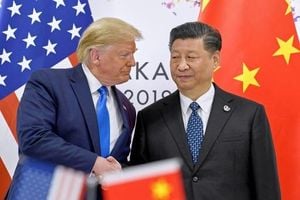The newly established Eurasian Association for the Support of the Russian Language is set to bolster the presence of Russian culture and language across various regions, particularly in Eurasia, Latin America, and Africa. Announced during a round table discussion on March 19, 2025, by Russia’s Minister of Education Sergei Kravtsov, this initiative is seen as a crucial step towards promoting traditional values and enhancing educational projects linked to the Russian language.
During his address, Kravtsov emphasized the importance of this platform in expanding cooperation with nations showing a burgeoning interest in learning Russian. He remarked, “The creation of support centers for the Russian language and culture unified in an association will open new possibilities for the development of a common educational space in Eurasia.” This strategic initiative aims to reinforce ties not only with Eurasian countries but also countries in Latin America and Africa, regions where interest in the Russian language has significantly increased.
With the establishment of centers that focus on the Russian language and culture across the Eurasian Economic Union (EAEU) and the Commonwealth of Independent States (CIS), participants will not only learn the language but also engage with Russian literature. These centers are envisioned as gathering points for public figures and business representatives keen to improve humanitarian and economic relations with Russia.
The association's goals include providing educational institutions with resources such as literary works and establishing communities that unite speakers of the Russian language. Plans are underway to equip Russian language classrooms in schools, launch collaborative literary lounges, and host joint books readings and meetings with esteemed Russian authors.
Additionally, publishing houses and educational entities will collaborate with the Ministry of Education to open book pavilions and to facilitate myriad events related to Russian culture. An important part of this initiative will be hosting an international Olympiad in the Russian language designed for foreign learners, which underscores the commitment to establishing a robust educational framework for both local and foreign institutions.
“Such an interaction will benefit all participants involved,” Kravtsov noted, as the initiative also aims to launch programs like “Classic Friendship,” promoting exchanges between students of the CIS countries, thus enriching the educational experience and cultural awareness among these nations.
Alena Arshinova, First Deputy Chairwoman of the State Duma Committee on Education and Chairwoman of the Council of ANO 'Eurasia,' highlighted the extensive efforts towards the longevity and support of the Russian language. In her remarks, she stated that numerous organizations had been working on its development for years, making this collaboration a natural progression. Arshinova elaborated on the planned programs that would not only focus on language education but also include creative gatherings where students can meet respected authors and poets.
As part of the Ministry of Education's broader strategy, there will also be a network of Russian language and culture centers launched in the post-Soviet regions, alongside co-working spaces equipped for youth activities showcasing Russian heritage. These efforts will ensure that Russian literature reaches school libraries and community centers to foster a deeper appreciation for Russian culture.
Furthermore, professional growth programs for teachers of the Russian language will be established, enhancing their skills and abilities to better educate students abroad. The Ministry is dedicated to creating a unified model for teaching Russian in foreign countries, recognizing the significance of well-trained educators in achieving this goal.
In conclusion, the launch of the Eurasian Association for the Support of the Russian Language marks a pivotal development in promoting the Russian language and culture. By expanding its reach into various international territories, the initiative underscores a commitment to education and cultural exchange that will foster goodwill and cooperation among diverse nations. The success of this program hinges upon collaborative efforts between educational institutions, cultural organizations, and committed individuals devoted to enhancing the profile of the Russian language on the global stage.





